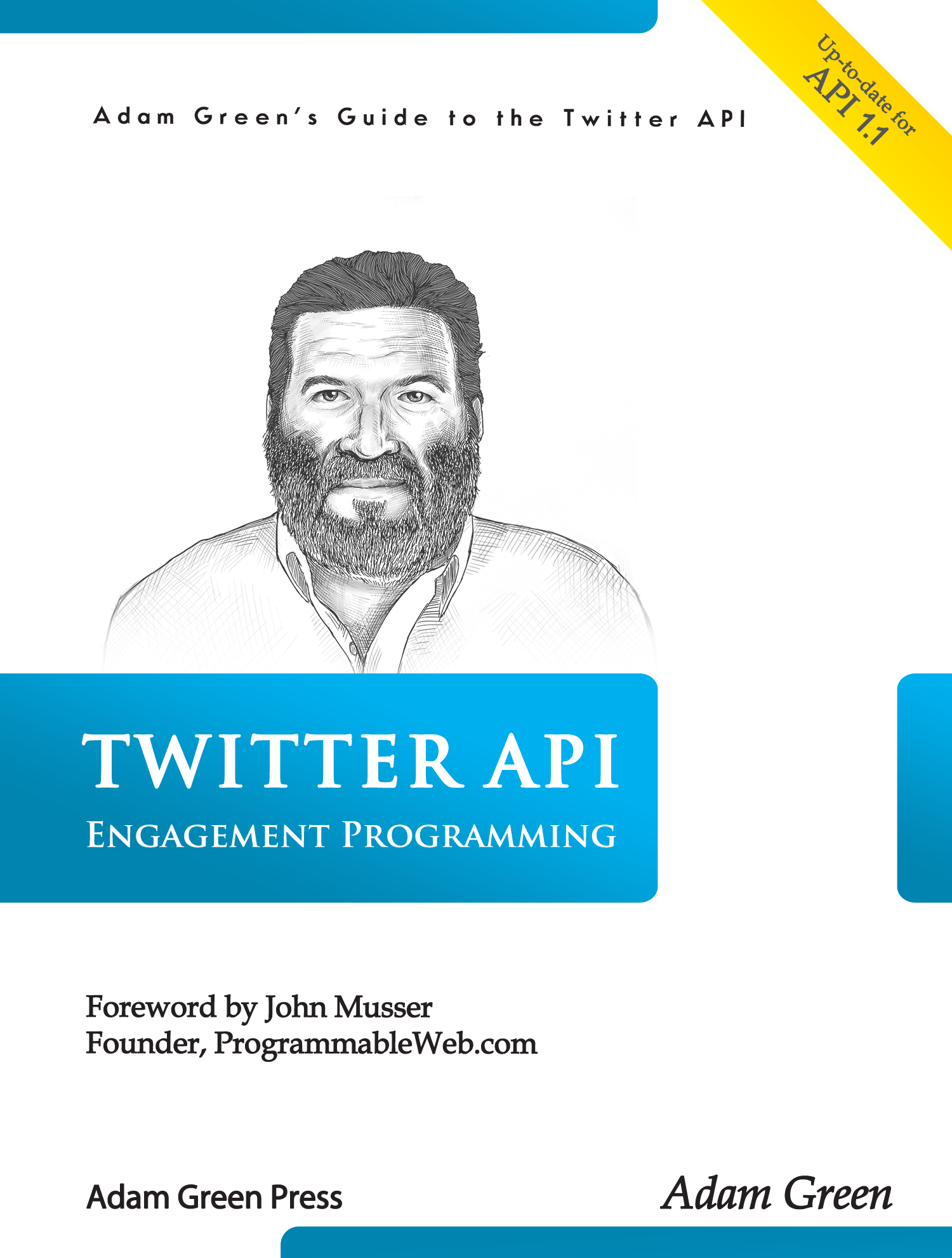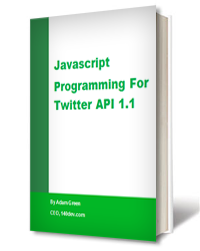I’m not the author of the Phirehose library for streaming API connections. I just use it as the network layer of my streaming API code. I don’t have the network coding skills to write this library’s code or to fix it, but I can encourage anyone using Phirehose or my 140dev Twitter framework code to […]
Adam Green
Twitter API Consultant
adam@140dev.com
781-879-2960
@140dev
Twitter API Programming Tips, Tutorials, Source Code Libraries and Consulting
- Tutorials on jQuery and Ajax
- Getting a user timeline with Javascript
- Javascript coding with the Search API
- Complete client app with tweet display
- Posting tweets through the API
- Looking up account details for Twitter users
- Converting Twitter API docs into working PHP code
- API console for debugging API requests

Hire Adam Green to Develop Custom Twitter Solutions
Contact Adam to schedule an initial consultation
by phone at (781) 879-2960
or email at adam@140dev.com Follow @140dev
Learn More140dev Google Groups
You can share your questions and experiences with the Twitter API on these discussion forums
140dev Streaming API Framework
Twitter API Tools
Twitter OAuth Discussion-
Recent Blog Posts
- 140dev streaming API framework upgrade is required for the Phirehose library
- The Twitter economy will employ a diverse labor force
- Following the Twitter ad revenue stream
- From Twitter platform to economy
- The inevitable path to vertical Twitter apps
- Twitter API Tools: Get lists owned by a Twitter account
- Streaming API: Multi-level tweet collection databases
- Twitter API Tools: Get list member user profiles
- Streaming API: Multiple server collection architecture
- Twitter API Tools: Handling protected accounts
Recent Twitter API Programming Tutorials
Blog Categories
- 140dev Source Code
- Announcements
- API error
- Apps in Tweets
- Automated following
- Automated Tweets
- Books
- Church of Twitter
- Consulting Tips
- Custom Twitter Client
- Data Mining Tweets
- Database Cache
- Education
- Email collection
- Engagement Programming
- Future of Twitter
- Gaining Followers
- Integrating Twitter with Wordpress
- Javascript
- JS coding for Twitter
- Lead Generation
- MSM on Twitter
- Phirehose
- Quality Control
- Rate Limits
- Search API
- Server configuration
- Social TV
- Streaming API
- The future of Twitter
- The next wave
- tmhOAuth
- Truthytweets
- Tweet Aggregation
- Tweet Display
- Twitter Advertising
- Twitter Analytics
- Twitter API
- Twitter API Console
- Twitter API Tools
- Twitter API Tutorials
- Twitter consultant
- Twitter Database Programming
- Twitter Developers
- Twitter documentation
- Twitter ecommerce
- Twitter Ecosystem
- Twitter Engagement Campaign
- Twitter Followers
- Twitter FUD
- Twitter IPO
- Twitter Language Detection
- Twitter Marketing
- Twitter OAuth
- Twitter Politics
- Twitter SEO
- Twitter Server Errors
- Twitter Spam
- Twitter Widget
- Uncategorized
- User Ranking
- Vertical Twitter Apps
Make a smooth transition to API 1.1
with Adam Green’s first book on
Twitter API programming


Adam Green has been building custom Twitter applications for 5 years. Thousands of people have used his open source libraries, ebooks, and tutorials to build their own websites and online tools based on the Twitter API.
Now Green has harnessed his years of coding experience to present the secret formula for successful Twitter Engagement programming.
Collect. Identify. Engage.
Collect a complete engagement profile for the most influential accounts for any area of interest. These tweets, mentions, friends, and followers will be stored in a MySQL database on your own server.
Identify the users you need to interact with, including the most mentioned tweets and tags. The reporting system included as source code can easily be enhanced to select exactly the type of users you need to help spread your message.
Engage with these key accounts using automated tweets and DMs. Follow new accounts that have been selected based on your specific needs, and track these accounts to know when they follow back.
All of the PHP source code for this book is available as open source under the MIT license.
 Free Javascript Ebook
Free Javascript Ebook
 Free Twitter OAuth Ebook
Free Twitter OAuth Ebook
Testimonials
“When I started investigating on how to build my Twitter based Site the Twitter API made my head spin. Sure it was powerful but where do I even begin? Then I found the 140dev Streaming API Framework and it made Twitter development a LOT easier! Without it I would probably spend hundreds of hours just on standard functions such as connecting to the Twitter API, managing data and displaying results. Thanks 140DEV for such a cool tool!"
- Paul Valkama, http://StreamClock.com
“The most important part of any technology effort is the nature of the people you work with. The people at 140dev are world class best. They have years of experience, a deep knowledge of Internet technologies, extensive familiarity of the Twitter API and a proven ability to deliver. They also work great with others. Frankly they have been so incredible I am amazed and really hope we can continue the relationship for a decade."
- Bob Gourley, http://twitchimp.com
“We worked with Adam and the 140dev team to build a Twitter business focusing on healthcare companies. 140dev brought unparalleled knowledge of Twitter mechanics, but also an excellent understanding of how Twitter fits into business strategy. They proved to be ideal development partners: committed to reaching our project’s goals, generous with sharing their knowledge, and dedicated to delivering beyond our expectations, despite working across continents and time zones. We now see them as an extended part of our business and hope to work with them in many future projects."
© 2013 by 140 Dev, LLC



